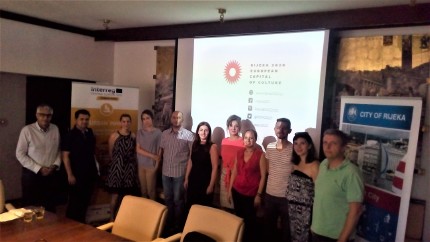2nd mentoring workshop in Rijeka
Rijeka Core team representatives (City of Rijeka, Ericsson NT d.d., Sense Consulting d.o.o. and Multilink d.o.o.), as well as the representatives from Rijeka 2020 d.o.o., gathered on their 2nd training with CyberForum representative dr. Ralf Trunko, at 12th July 2017 in Rijeka.
After introducing URBAN INNO project in general, mr. Trunko, on behalf of mentoring partner, held two sessions regarding Smarter City Karlsruhe initiative: SmartQuarter Karlsruhe and SmartQuarterVision KA 2030+. Both presentations depicted background, model and approach by which the City of Karlsruhe intended to implement smart and useful solutions regarding Energy, Mobility, Life Quality, Trade/Logistics and Administration/Security.
In addition, the participation method World Café was presented in step-by-step instructions. In this section the Core team workshop participants meet all needful information on how to implement the method regarding local pilot issue - Engaging citizens in creation of Citizen Collaboration Platform – CCP. Since the City of Rijeka has been elected for the European Capital of Culture (ECC) in 2020, the pilot activities will be primarily focused on the city culture capacities. For this reason, representatives of the city-owned company Rijeka 2020 d.o.o., established with the purpose of ECC-project implementation, held a presentation about ECC-project, explaining ongoing activities and road map of the planned achievements. At this point, the ground issue of both working teams is to find, shape and optimize the intersection of those two projects – Rijeka ECC and URBAN INNO local pilot, in order to fulfill needs and expectations of all parties, especially end-users/citizens.
Furthermore, Mr. Trunko presented three more participative methods, which can be combined with the World Café: One Shot Video, Crowdsourcing and Future Deck. Although all three were very interesting and incentive, one took more attention than the others: Future Deck. The method was recognized by the workshop participants as stimulating and encouraging, and could be used during World Café sessions as an opening act, to unclench the attendees and make the atmosphere more comfortable.
In the final part, a simulation of World Café planning for ECC purposes was conducted. As in previous training sections, an interactive discussion took place, in which the topic ‘audience development’ rose up as one of the concerns of ECC related issues. The discussion soon transformed into brainstorming, opening many questions that have to be resolved in the future months.

Rijeka Core team with Rijeka2020 representatives and mentor Ralf Trunko (CyberForum)